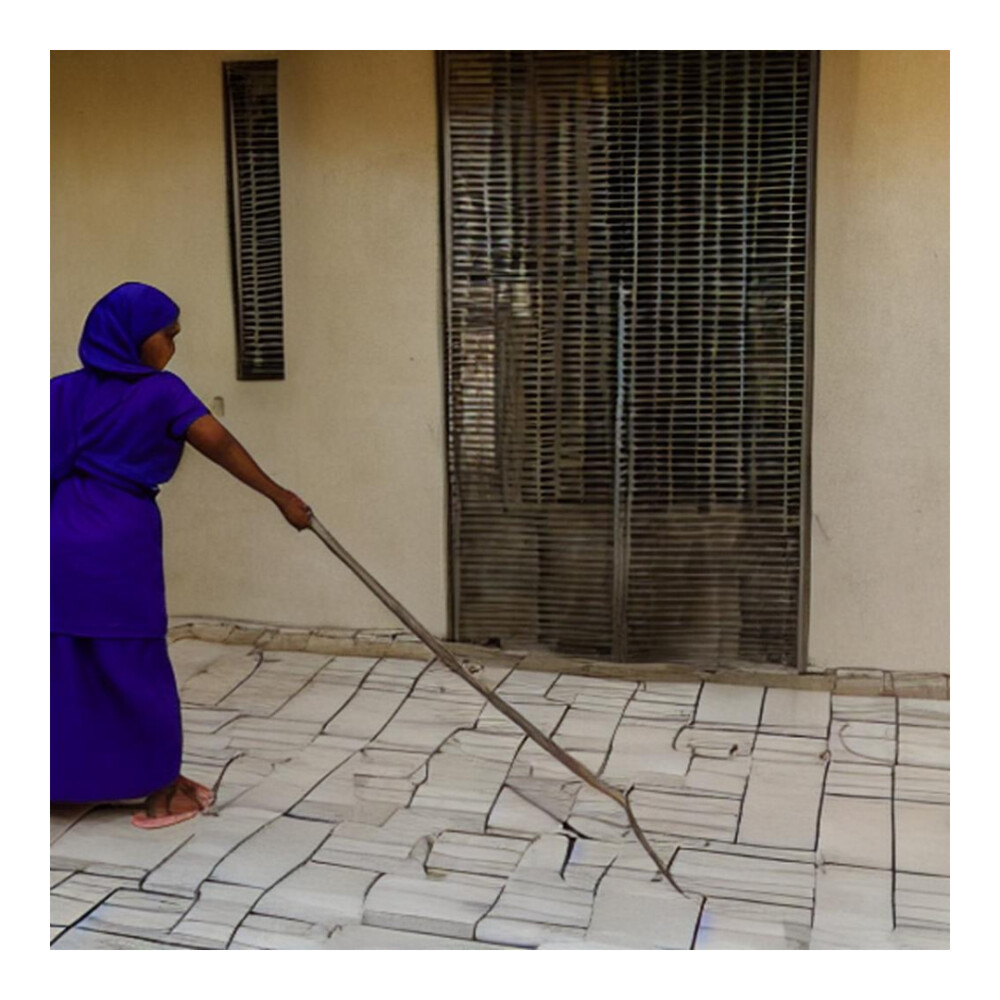Campaign
Equal Rights for Domestic Workers
Migrant domestic workers in the Gulf form a large share of the labour force, but are excluded from the labour law and poorly protected by existing regulations. Female migrants who work in the private sphere of the home are especially vulnerable to a range of exploitative practices including wage theft, overwork, lack of healthcare, restrictions on mobility and communication, as well as verbal, physical, and sexual abuse.

> 50%
More than 50% of employers in Kuwait did not have a written employment contract with the domestic workers they employed, and over 70% of domestic workers were unaware of the domestic worker law in 2018. (Arab Times)
79%
Domestic workers account for the majority (79%) of all female migrant employment in Oman’s private sector (Oman Data Portal)
3.5 million
Domestic workers were employed in Saudi Arabia in 2022, representing 33% of all migrants in the country (Gulf News)
$.30-.40
Most domestic workers earn as little as 30 to 40 cents an hour, with few protections for their wages
Background
The dependency on domestic workers in the Gulf is extraordinarily high compared to other regions in the world, but domestic workers’ rights remain inadequately protected. The confined nature of their work in private homes, and the rigid sponsorship (kafala) system make domestic workers overly dependent on their employers. These dynamics creates situations ripe for exploitation. Common abuses include:
- Working excessive hours with few breaks and no overtime compensation
- Overwhelming task loads, with one worker often playing the role of nanny, caregiver, cook, and cleaner
- Receiving no days off
- Inability to leave the house without permission or supervision, or at all
- Unfair, delayed, or denied wages
- Restricted or denied access to communication, including phone and internet
- Physical, sexual, and verbal abuse
- Poor living conditions and lack of privacy
- Work injuries due to lack of safety standards
Some Gulf countries have introduced dedicated domestic worker laws, standardised working contracts, and taken steps to regulate recruitment agencies. However, these regulations continue to suffer from protection gaps, and the terms of employment remain inferior to the labour law. Changing jobs, for example, remains more restricted for domestic workers than workers under the labour law.
Enforcement of these regulations also remains weak, and complaints mechanisms are often both difficult to access and ineffective, with few resources dedicated to supporting workers in distress. Except in some of the most gruesome abuse cases, employers are rarely held accountable for their actions.
Domestic workers across the region consequently remain vulnerable to the whims of individual employers, who maintain virtually unchecked power over workers’ legal status, as well as their living and working conditions.
In 2022, there were 753,165 migrant domestic workers in Kuwait, equivalent to nearly 50% of the total Kuwaiti citizen population. (Central Statistical Bureau of Kuwait)
The issues
Overwork
Domestic workers who live with their employers are almost always “on call” and can work upwards of 100 hours per week. Bahrain and Oman do not set any upper limits on working hours for domestic workers. Saudi Arabia’s laws require a minimum rest period of 9 hours, in theory permitting up to 15 hours per day.
While Kuwait (12), and the UAE (12) do set maximum working hours, they remain higher than the 8-hours mandated for private sector workers under the labour law. Only Qatar’s standard contract stipulates an 8-hour work day, with up to two additional hours of overtime.
Payment for overtime is not provided for in the law, except in Qatar and Kuwait. But with no adequate enforcement mechanisms and weak complaints systems, compliance with these regulations tends to be low. A 2018 survey in Kuwait found that nearly 80% of domestic worker respondents did not receive overtime compensation and work for more than 10 hours a day, while over 50% do not receive their off day.
| Maximum Daily Working Hours | Rest | Day off | Overtime | |
| UAE | 12 hours | 12 throughout the day, including 8 consecutive hours of rest | One day off per week | Not specified |
| Saudi | Not specified, but 15 based on minimum rest requirements | Nine hours total | One day off per week | Not specified |
| Kuwait | 12 hours | Throughout the working day, and an hour of rest after 5 consecutive working hours, and eight consecutive hours at night, according to the standard unified contract | One day off per week |
Half-day wage for these services for up to two additional hours
|
| Qatar | 10 hours, including 2 hours of overtime | Throughout the day for rest, food, and worship. | One day off per week |
125% of the normal wage for up to two additional hours
|
| Oman | Not specified | Not specified | One day off per week | Not specified |
| Bahrain | Not specified | Not specified | Not specified | Not specified |
Low wages & wage theft
Domestic workers are among the poorest populations in the Gulf according to a 2017 UN report. Only Qatar and Kuwait stipulate minimum wages for domestic workers, while origin countries may set minimum wages for their own nationals. Coupled with the lack of regulation over working hours, the hourly rate for these workers can be as low as 30 – 40 cents an hour.
Still, non-payment or underpayment of salaries is the top labour abuse reported by workers’ embassies in the Gulf. Reports of not paying domestic workers for months, or sometimes for years, are common. While laws do protect workers’ full and timely payment of wages, they are poorly enforced. Domestic workers are not required to be paid electronically or through Wage Protection Systems that cover workers under the labour law. This means that even if they are able to file a complaint, employers can easily falsify evidence as there is no electronic record.
Employers may withhold or deduct payment for various reasons; some attempt to recoup recruitment costs, which has been on the rise in recent years; others may use it as a disciplinary tool or may withhold wages until the contract period is over to ensure that domestic workers do not escape. Others do so to compel domestic workers to continue to work if they want to quit or if they had finished their contract.
Isolation
While regulations in most Gulf states stipulate that a domestic worker should have a day off, none clarify that this day off should be spent at the worker’s leisure or outside the house. Employers routinely prevent domestic workers from leaving the home without permission or supervision, often under the false perception that they are “protecting” workers, or that they are responsible for their conduct. In the worst cases, domestic workers may be locked in the house or their rooms when their employer leaves for the day, or even on holiday. Not only are workers’ rights to mobility clearly violated, but they are in direct danger of a health emergency. A domestic worker was found dead in Khamis Mushait in Saudi Arabia after a fire ravished a house where she was locked inside.
Workers may be further isolated with little to no access to phones or the internet. Denying workers’ basic right to mobility and communication can have grave consequences on their psychological well-being. Workers who are cut off from their own communities back home and unable to join communities in the country of employment are prone to depression, and are unable to get help when things go wrong. A study of hospitalised domestic workers in Kuwait reported that “Psychiatric morbidity among housemaids is two to five times higher than the native female population”.
Physical & Sexual Abuse
Isolation also makes workers vulnerable to physical and sexual abuse. Some employers use forced confinement itself as a disciplinary measure, punishing domestic workers by trapping domestic workers in bathrooms or stockrooms, sometimes for days. All the Gulf states have ratified the ILO Convention on Forced Labour, which equates any method of forced confinement by an employer to forced labour. Yet, domestic worker regulations still do not adequately address this common treatment of domestic workers.
Other employers take advantage of the power they have over worker who are completely dependent on them from everything to food, housing, and their legal status, to abuse and exploit. Stories of sexual assault are particularly common. Workers are often hesitant to talk in detail about these experiences, but the stories are common. In the case of physical abuse, the most gruesome of stories — such as the murders of Jullebee Ranara and Joanna Demafeli in Kuwait — may spark uproar momentarily, but conditions remain the same. In some cases, even clear physical abuse does not prompt officials to act. The plight of Judith, a Kenyan domestic worker who was severely abused in Qatar, demonstrates the weak protections and poor justice mechanisms that domestic workers confront.
Unlike workers under the labour law, domestic workers are also excluded from work injury and disability compensation laws. Domestic workers who suffer from disability due to work injuries are often repatriated back to their home countries.
Verbal Abuse & Negative Stereotypes
Discourses that misrepresent and demean domestic workers are rampant in Gulf news media, entertainment, and everyday conversation. Domestic workers are commonly accused of sorcery, sexual deviance, mental illness, and violence, often alongside racial stereotypes. Domestic workers are perceived as a “necessary evil,” explaining why the demand for them continues to rise despite negative perceptions.
Inside the household, many domestic workers are subjected to verbal abuse by employers such as shouting, belittlement, insults, and threats that are psychologically damaging. A Filipina domestic worker in Kuwait told Human Rights Watch “my employer always called me dog, donkey, as if I am not a person any more. ”
Take Action
Recommendations for Gulf Governments
Ratify Convention 189 on decent work for domestic workers and incorporate its stipulations into local domestic labour laws.
Create a domestic labour inspection task force to monitor working conditions inside the household and train officials on investigating cases of forced labour and modern slavery.
Include domestic workers in wage protection systems, and penalise employers who fail to make on-time payments. Ensure workers receive their end-of-service benefits before they return home.
Do not permit employers who have a proven track record of abuse from hiring new domestic workers, and improve regulation of recruitment agencies.
Abolish absconding laws, and at minimum, allow domestic workers to more easily change their employers on the same terms as labour law workers.
Set up walk-in shelters and provide better access to justice for domestic workers who are isolated within employers’ households.













